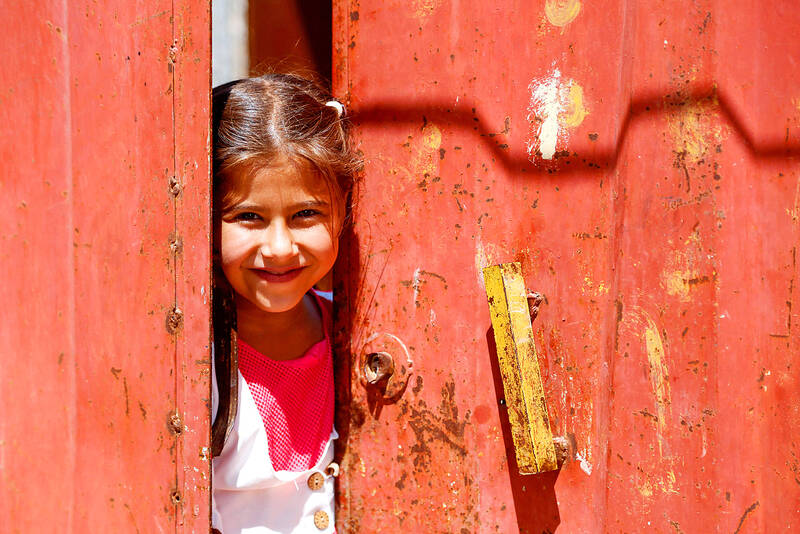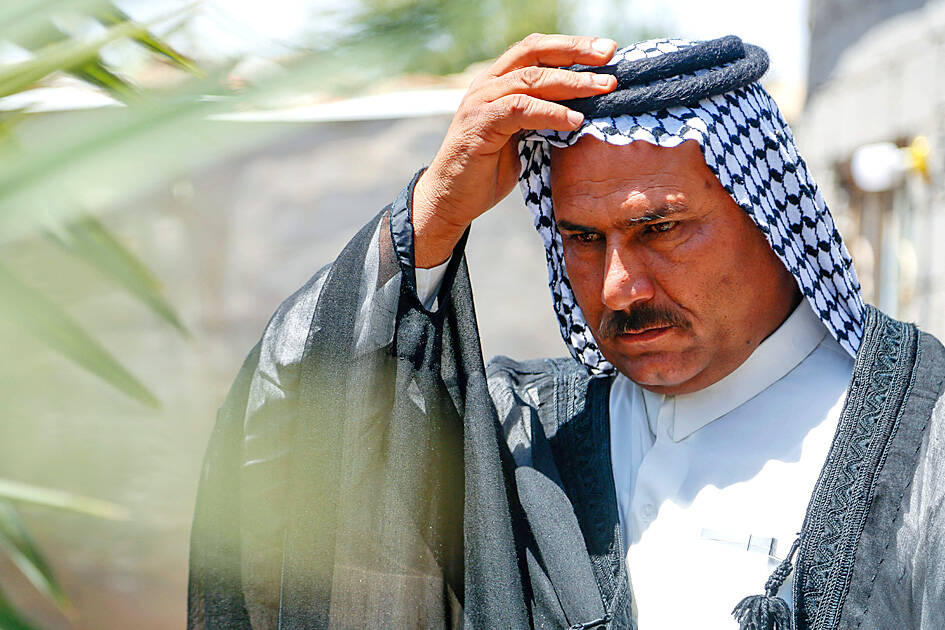Haydar Mohamed once grew wheat and barley, but Iraq’s relentless drought has forced him off the land and into the city, where he now works in construction and drives a taxi.
“The transition is difficult,” said Mohamed, 42, who abandoned village life several years ago for a shantytown in the central city of Karbala.
He is part of a growing wave of climate migrants in Iraq.

Photo: AFP
Years of dire water scarcity left him no choice but to move, the father of five said.
“If you don’t work, you don’t eat,” he said.
Until 2017, Mohamed, like his father before him, worked farmland in the remote village of al-Khenejar in Iraq’s southern Diwaniya Province.

Photo: AFP
In a good year, they would harvest 40 or 50 tonnes of grain, he said.
However, “water shortages have impacted farmland and livestock,” said the man with a neat moustache and a traditional black robe worn over a white gown.
“In our region, there is no work,” he said. “I have children in school, which involves expenses. We needed a livelihood.”
He now earns about US$15 a day on construction sites in the Shiite city, which thrives thanks to a steady flow of religious pilgrims.
To supplement his income, he works shifts as a taxi driver.
Near his home, cows graze on rubbish strewn across the dusty ground and gray cinderblock buildings line the bumpy alleys, connected for free by the municipality to power lines and water pipes.
The UN ranks Iraq, still recovering from decades of dictatorship and war, as one of the world’s five countries most impacted by some effects of climate change.
The economy is driven by oil exports, but the second-biggest sector is agriculture, which makes up 5 percent of GDP and employs 20 percent of the workforce.
Water scarcity is extreme in the country of 42 million that endures blistering summer heat and regular dust storms, the shortfall worsened by upstream river dams in Turkey and Iran.
The UN says that nearly one in five people live in an area hit by water shortages, while state authorities have been forced to limit areas designated for cultivation.
In central and southern Iraq, “12,212 families were still displaced due to drought conditions” in March, the UN International Organization for Migration (IOM) said.
Across Diwaniya, 120 villages now rely on trucked water deliveries, up from 75 last summer, Diwaniya Governor Maitham al-Chahd said.
“Thousands of hectares have been abandoned,” he said.
Among the other worst-hit provinces are Dhi Qar and Maysan, said the IOM, which estimates that 76 percent of displaced people move to cities.
The rural flight piles pressure on urban areas where infrastructure is dilapidated after decades of conflict, corruption and mismanagement.
A UN report last month warned of the risk of “social unrest” driven by climate factors.
“In the absence of sufficient public services and economic opportunity ... climate-driven urbanization and mobility can reinforce pre-existing structures of marginalization and exclusion,” the report said.
Al-Chahd said that rural migrants faced unemployment in the cities, where there “are not enough job opportunities” for all the newcomers.
“Public services cannot meet the needs of growing city populations,” he added.
Meanwhile, rural areas are being deserted, including the village of al-Bouzayad, where the main irrigation canal has completely dried up.
About 100 families have left in the past two years, and today only 170 households are still listed on the municipal register, said al-Bouzayad Mayor Majed Raham, several of whose relatives have joined the exodus.
Abandoned adobe houses sit next to unfinished yellow-brick constructions. In one empty dwelling, rooms stripped of their doors and windows show signs of the lives that have been upended.
Portraits of Shiite figure Imam Hussein still hang on the walls, a padlocked room contains personal items and a satellite dish gathers dust in the courtyard.
Those who have stayed depend on insufficient water deliveries made by tankers sent by the governorate authorities, which they deplore.
Raham said that most survive on either state benefits or money earned by their children, who commute daily to the nearest town.
“The majority want to leave, but they don’t have the means,” he said.

ANGER: A video shared online showed residents in a neighborhood confronting the national security minister, attempting to drag her toward floodwaters Argentina’s port city of Bahia Blanca has been “destroyed” after being pummeled by a year’s worth of rain in a matter of hours, killing 13 and driving hundreds from their homes, authorities said on Saturday. Two young girls — reportedly aged four and one — were missing after possibly being swept away by floodwaters in the wake of Friday’s storm. The deluge left hospital rooms underwater, turned neighborhoods into islands and cut electricity to swaths of the city. Argentine Minister of National Security Patricia Bullrich said Bahia Blanca was “destroyed.” The death toll rose to 13 on Saturday, up from 10 on Friday, authorities

OPTIMISTIC: A Philippine Air Force spokeswoman said the military believed the crew were safe and were hopeful that they and the jet would be recovered A Philippine Air Force FA-50 jet and its two-person crew are missing after flying in support of ground forces fighting communist rebels in the southern Mindanao region, a military official said yesterday. Philippine Air Force spokeswoman Colonel Consuelo Castillo said the jet was flying “over land” on the way to its target area when it went missing during a “tactical night operation in support of our ground troops.” While she declined to provide mission specifics, Philippine Army spokesman Colonel Louie Dema-ala confirmed that the missing FA-50 was part of a squadron sent “to provide air support” to troops fighting communist rebels in

Two daughters of an Argentine mountaineer who died on an icy peak 40 years ago have retrieved his backpack from the spot — finding camera film inside that allowed them a glimpse of some of his final experiences. Guillermo Vieiro was 44 when he died in 1985 — as did his climbing partner — while descending Argentina’s Tupungato lava dome, one of the highest peaks in the Americas. Last year, his backpack was spotted on a slope by mountaineer Gabriela Cavallaro, who examined it and contacted Vieiro’s daughters Guadalupe, 40, and Azul, 44. Last month, the three set out with four other guides

ECONOMIC DISTORTION? The US commerce secretary’s remarks echoed Elon Musk’s arguments that spending by the government does not create value for the economy US Secretary of Commerce Howard Lutnick on Sunday said that government spending could be separated from GDP reports, in response to questions about whether the spending cuts pushed by Elon Musk’s Department of Government Efficiency could possibly cause an economic downturn. “You know that governments historically have messed with GDP,” Lutnick said on Fox News Channel’s Sunday Morning Futures. “They count government spending as part of GDP. So I’m going to separate those two and make it transparent.” Doing so could potentially complicate or distort a fundamental measure of the US economy’s health. Government spending is traditionally included in the GDP because